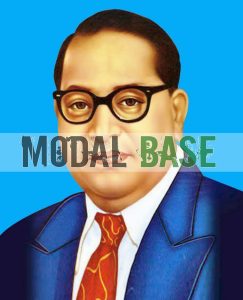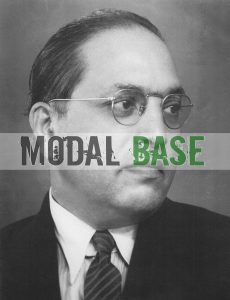Bhimrao Ramji Ambedkar Biography: Age, Legacy, Nationality, And Wikipedia

Bhimrao Ramji Ambedkar, fondly called Babasaheb, was a visionary leader whose life story continues to inspire millions. Born on April 14, 1891, in India, he overcame immense challenges of caste discrimination to become a renowned jurist, economist, and social reformer. As the principal architect of India’s Constitution, Ambedkar championed equality, justice, and human rights. His relentless efforts to uplift marginalised communities and his conversion to Buddhism marked significant milestones in his journey. This biography explores his remarkable achievements, enduring legacy, and the lessons his life holds for us today.
Also Read: France Castro Biography: Age, Siblings, Husband, Nationality, And Wikipedia
Bhimrao Ramji Ambedkar Biography
Bhimrao Ramji Ambedkar, commonly known as Babasaheb Ambedkar, was a visionary leader, social reformer, economist, and the principal architect of India’s Constitution. He was born on April 14, 1891, in Mhow, Madhya Pradesh, India, into a Dalit family, which faced extreme caste-based discrimination. Despite growing up in an environment of social inequality, Ambedkar emerged as a symbol of courage, determination, and intellectual brilliance.
From an early age, Ambedkar showed exceptional academic potential. He completed his schooling under challenging circumstances and later earned a degree in economics and political science from the University of Bombay. His thirst for knowledge led him abroad, where he studied at Columbia University in the United States and the London School of Economics in England. He achieved multiple doctorates, becoming one of the most highly educated individuals of his time. These academic accomplishments laid the foundation for his future contributions to society.
Professionally, Ambedkar wore many hats. He started as a professor and lawyer but soon became a leading voice against caste discrimination and social inequality. He founded organizations like the Bahishkrit Hitakarini Sabha to fight for the rights of marginalized communities. His activism brought him into politics, where he became the leader of Dalits and other oppressed groups. He established political parties such as the Independent Labour Party and the Scheduled Castes Federation to champion social justice and equal rights.
One of Ambedkar’s greatest achievements was his role as the chairman of the drafting committee of the Indian Constitution. As the principal architect, he ensured that the Constitution was a transformative document that promoted justice, equality, and democracy. His work laid the foundation for a new, inclusive India, emphasizing the eradication of caste-based discrimination and the protection of individual rights.
Ambedkar was also a prolific writer and thinker. His works, such as Annihilation of Caste and The Problem of the Rupee, reflect his deep understanding of social, economic, and political issues. These writings continue to be studied and admired for their insight and vision. Beyond his intellectual contributions, Ambedkar was a man of action. In 1956, he embraced Buddhism as a way to reject caste-based oppression and led a mass conversion movement, inspiring millions of Dalits to follow suit. This marked the beginning of the Dalit Buddhist movement, which continues to thrive today.
Ambedkar’s legacy extends far beyond his lifetime. He was posthumously awarded the Bharat Ratna, India’s highest civilian honor, in 1990. His life serves as a beacon of hope for those who believe in the principles of justice, equality, and human dignity. Memorials, universities, and institutions dedicated to his name keep his vision alive. His contributions to India’s socio-political fabric have left an indelible mark, inspiring generations to strive for a more equitable society.
Bhimrao Ramji Ambedkar’s story is one of resilience, intellect, and an unyielding commitment to social justice. He transformed challenges into opportunities and became a leader who changed the course of history. His life remains an enduring example of how education, determination, and the fight for equality can bring about meaningful change.
Bhimrao Ramji Ambedkar Early Life and Education
Bhimrao Ramji Ambedkar was born on April 14, 1891, in Mhow, Madhya Pradesh, India. He was the youngest of fourteen siblings in a Dalit family, belonging to the Mahar caste, which faced severe social ostracism and untouchability. His father, Ramji Sakpal, served in the British Indian Army, while his mother, Bhimbai, played a key role in shaping his early moral values. Despite his family’s financial struggles, Ambedkar demonstrated a keen intellect and passion for learning from an early age.
Education became Ambedkar’s pathway to liberation from caste oppression. He studied at Elphinstone High School, becoming the first Dalit to complete matriculation in his community. Later, he joined Elphinstone College and obtained a degree in economics and political science from the University of Bombay. Determined to pursue higher education, Ambedkar moved abroad. He earned a Master’s degree and a PhD in economics from Columbia University, and subsequently attended the London School of Economics, earning another doctorate. His time abroad exposed him to ideas of social justice, equality, and democracy, which profoundly influenced his future activism.
Ambedkar’s academic journey was remarkable not only for his achievements but also for his perseverance in overcoming caste-based discrimination. His educational accomplishments later served as the foundation for his fight against social inequality.
Bhimrao Ramji Ambedkar Political Career
Bhimrao Ambedkar’s political career was deeply rooted in his commitment to social justice and equality. His entry into politics marked a turning point for marginalized communities, especially the Dalits, who were subjected to centuries of discrimination. Ambedkar began his political journey by advocating for the rights of Dalits, believing that political power was crucial for achieving social change.
In 1936, he founded the Independent Labour Party, which aimed to represent the interests of laborers and marginalized groups. The party contested elections and gained considerable support, highlighting the need for reforms in labor rights and social equity. Later, he established the Scheduled Castes Federation to further champion the cause of Dalits and other oppressed communities. These organizations played a critical role in mobilizing support and raising awareness about caste-based discrimination.
Ambedkar’s political career reached its zenith when he was appointed as the chairman of the drafting committee for India’s Constitution. As a member of the Constituent Assembly, he advocated for fundamental rights, universal franchise, and the abolition of untouchability. His vision for an inclusive and democratic India made him one of the most influential figures in Indian politics.
Through his political leadership, Ambedkar brought attention to issues that had long been ignored, creating a legacy of empowerment and equality that continues to inspire.
Bhimrao Ramji Ambedkar Social Reforms and Advocacy
Bhimrao Ambedkar’s social reforms were transformative and addressed the deeply ingrained caste-based inequalities in Indian society. As a Dalit leader, Ambedkar understood firsthand the pain and humiliation faced by marginalized communities. His advocacy focused on eradicating untouchability and promoting social justice.
One of Ambedkar’s notable campaigns was the Mahad Satyagraha in 1927, where he fought for the right of Dalits to access public water resources. This protest was a symbolic act against caste discrimination and highlighted the need for social equality. He also called for equal rights in temples and public places, challenging the orthodox practices of untouchability. His landmark work, Annihilation of Caste, directly critiqued the caste system and called for its complete abolition.
Also Read: Dia Mirza Biography: Age, Husband, Nationality, And Wikipedia
Ambedkar believed that education was a powerful tool for liberation. He encouraged Dalits to pursue education and established schools and colleges to empower the community. His efforts also extended to women’s rights, advocating for gender equality and reforms in marriage laws.
His social reforms laid the groundwork for a more equitable society. By confronting injustice and promoting human dignity, Ambedkar’s advocacy continues to inspire movements for equality and justice.
Bhimrao Ramji Ambedkar Role in Drafting the Indian Constitution
Bhimrao Ambedkar’s role in drafting the Indian Constitution was monumental and cemented his legacy as one of India’s greatest visionaries. As the chairman of the Constitution Drafting Committee, Ambedkar played a key role in shaping the legal framework of independent India. His deep understanding of law, politics, and social issues allowed him to craft a Constitution that reflected the values of justice, equality, and democracy.
Ambedkar’s vision for the Constitution was inclusive and forward-thinking. He introduced provisions for fundamental rights, ensuring equality before the law and protection against discrimination. He also emphasized the importance of social justice by incorporating measures for affirmative action to uplift marginalized communities. His advocacy for universal adult franchise allowed every Indian, irrespective of caste, gender, or religion, to participate in the democratic process.
In addition to addressing social inequalities, Ambedkar focused on economic justice. He advocated for policies that would reduce disparities and create opportunities for all. His contributions laid the foundation for a modern and progressive India.
The Indian Constitution, drafted under Ambedkar’s leadership, remains a testament to his commitment to creating a just and inclusive society. His work continues to inspire constitutional experts and social reformers worldwide.
Bhimrao Ramji Ambedkar Conversion to Buddhism
Bhimrao Ambedkar’s conversion to Buddhism in 1956 was a significant and symbolic act that rejected caste-based oppression. After years of advocating for social justice, Ambedkar concluded that Hinduism’s caste system could not be reformed and sought an alternative spiritual path. Buddhism, with its principles of equality and compassion, aligned with his vision for a society free from discrimination.
On October 14, 1956, Ambedkar embraced Buddhism in a historic ceremony in Nagpur. Along with him, thousands of Dalits also converted, marking the beginning of the Dalit Buddhist movement. This mass conversion was not just a religious shift but a socio-political statement against the caste system. Ambedkar believed Buddhism provided a framework for spiritual and social liberation.
Through his writings, such as The Buddha and His Dhamma, Ambedkar articulated the philosophical underpinnings of Buddhism and its relevance to modern society. He emphasized ethical living, rationality, and equality, encouraging followers to adopt these principles in their daily lives.
Ambedkar’s conversion to Buddhism was transformative and continues to influence movements for social justice. It represented his unwavering commitment to creating a society based on dignity and equality, inspiring millions to embrace Buddhism as a path to liberation.
Bhimrao Ramji Ambedkar Legacy and Recognition
The legacy of Bhimrao Ambedkar transcends generations, making him an enduring symbol of social justice, equality, and empowerment. His contributions to India’s socio-political landscape have left an indelible mark, and his ideas continue to resonate globally.
Ambedkar’s legacy is celebrated through numerous institutions, memorials, and awards. He was posthumously awarded the Bharat Ratna, India’s highest civilian honor, in 1990, recognizing his unparalleled contributions to the nation. Universities, research centers, and public spaces named after him highlight his lasting influence.
His ideas on democracy, social justice, and economic equity continue to inspire policymakers and activists. Movements advocating for Dalit rights and equality draw heavily from Ambedkar’s teachings, ensuring his vision remains relevant in contemporary discourse. His writings, including Annihilation of Caste and The Buddha and His Dhamma, are studied worldwide, providing insight into his revolutionary ideas.
Ambedkar’s life and work serve as a powerful reminder of the importance of education, determination, and the fight for human dignity. His legacy is not confined to history books but lives on in the hearts of millions who strive for a fair and equitable society. Bhimrao Ramji Ambedkar remains a beacon of hope and inspiration for generations to come.
Bhimrao Ramji Ambedkar Age and Date of Birth
Bhimrao Ramji Ambedkar was born on April 14, 1891. As of the time of his passing on December 6, 1956, Bhimrao Ramji Ambedkar’s age was 65 years.
Also Read: Nicholas Ukachukwu Biography: Age, Wife, Children, State of Origin, And Wikipedia
Bhimrao Ramji Ambedkar Death Date
Bhimrao Ramji Ambedkar passed away on December 6, 1956. His death date marks the end of a remarkable journey dedicated to social justice and equality.
Bhimrao Ramji Ambedkar Wikipedia
- Bhimrao Ramji Ambedkar was born on April 14, 1891, in Mhow, Madhya Pradesh, India.
- He was a Dalit leader, social reformer, and the principal architect of India’s Constitution.
- Ambedkar earned doctorates from Columbia University and the London School of Economics.
- He founded the Independent Labour Party and Scheduled Castes Federation to fight for marginalized communities.
- Ambedkar chaired the drafting committee of the Indian Constitution, ensuring justice and equality for all citizens.
- He authored influential works like Annihilation of Caste and The Problem of the Rupee.
- In 1956, Ambedkar converted to Buddhism, leading a mass conversion movement for Dalits.
- He was posthumously awarded the Bharat Ratna, India’s highest civilian honor, in 1990.
- Ambedkar’s legacy includes numerous memorials, institutions, and movements advocating for social justice.
- His life remains a symbol of resilience, education, and the fight for equality and human dignity.
Bhimrao Ramji Ambedkar Profile Table

| Profile | Information |
|---|---|
| Real Name | Bhimrao Ramji Ambedkar |
| Age | 65 years (at the time of his death) |
| Date of Birth | April 14, 1891 |
| Net Worth | Not known |
| Wife | Ramabai Ambedkar (first wife), Savita Ambedkar (second wife) |
| Children | Yeshwant Ambedkar |
| Parents | Ramji Sakpal (Father), Bhimbai Sakpal (Mother) |
| Religion | Buddhism (converted in 1956) |
| State of Origin | Madhya Pradesh, India |
| Alma Mater | Columbia University, London School of Economics, University of Bombay |
| Education | Degrees in Economics, Political Science, Law; Multiple Doctorates |
| Nationality | Indian |
| Career | Jurist, Economist, Politician, Social Reformer |








One Comment